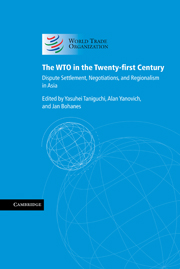Book contents
- Frontmatter
- Contents
- Notes on contributors
- Acknowledgements
- Table of dispute settlement cases and reports
- List of abbreviations
- Introduction
- PART I The WTO at Ten
- PART II Accomplishments and Future Prospects of the WTO Dispute Settlement System
- 3 The WTO dispute settlement system after ten years: the first decade's promises and challenges
- 4 WTO dispute settlement practice 1995–2005: lessons from the past and future challenges
- 5 Evaluating WTO dispute settlement: what results have been achieved through consultations and implementation of panel reports?
- 6 The responsibilities of a WTO Member found to have violated WTO law
- 7 ‘Public–private partnerships’ in WTO dispute settlement: the US and EU experience
- 8 Accomplishments of the WTO dispute settlement mechanism
- 9 Arbitration as an alternative to litigation in the WTO: observations in the light of the 2005 banana tariff arbitrations
- 10 The evolving WTO dispute settlement system
- PART III Asian Perspectives on WTO Dispute Settlement
- PART IV The Doha Development Agenda and Beyond
- PART V Asian Regional Integration and the Multilateral Trading System
- Index
4 - WTO dispute settlement practice 1995–2005: lessons from the past and future challenges
from PART II - Accomplishments and Future Prospects of the WTO Dispute Settlement System
Published online by Cambridge University Press: 05 March 2012
- Frontmatter
- Contents
- Notes on contributors
- Acknowledgements
- Table of dispute settlement cases and reports
- List of abbreviations
- Introduction
- PART I The WTO at Ten
- PART II Accomplishments and Future Prospects of the WTO Dispute Settlement System
- 3 The WTO dispute settlement system after ten years: the first decade's promises and challenges
- 4 WTO dispute settlement practice 1995–2005: lessons from the past and future challenges
- 5 Evaluating WTO dispute settlement: what results have been achieved through consultations and implementation of panel reports?
- 6 The responsibilities of a WTO Member found to have violated WTO law
- 7 ‘Public–private partnerships’ in WTO dispute settlement: the US and EU experience
- 8 Accomplishments of the WTO dispute settlement mechanism
- 9 Arbitration as an alternative to litigation in the WTO: observations in the light of the 2005 banana tariff arbitrations
- 10 The evolving WTO dispute settlement system
- PART III Asian Perspectives on WTO Dispute Settlement
- PART IV The Doha Development Agenda and Beyond
- PART V Asian Regional Integration and the Multilateral Trading System
- Index
Summary
Lessons from the past
Most dispute settlement procedures of the General Agreement on Tariffs and Trade (GATT) and of the World Trade Organization (WTO) resulted from previous dispute settlement practices and were progressively codified (for instance, in 1966, 1979, 1982, 1989, and in 1994) in response to particular GATT and WTO legal problems.1 The frequent use of ‘constructive ambiguity’ as a diplomatic method for facilitating political consensus on the conclusion of broadly framed GATT and WTO agreements, as well as the compulsory jurisdiction provided for in the WTO Understanding on Rules and Procedures Governing the Settlement of Disputes (DSU) as a means to ‘clarify the existing provisions of those agreements in accordance with customary rules of interpretation of public international law’ (Article 3.2 of the DSU), entail a far-reaching delegation of (quasi-)judicial powers to WTO dispute settlement bodies. Negotiating incomplete agreements and delegating the future clarification of contested treaty interpretations to an interdependent system of WTO dispute settlement bodies reduced bargaining costs and enhanced the effectiveness of collective bargaining. Yet, many WTO governments remain reluctant to admit the systemic consequences of this ‘judicialization’ of WTO rules for the future evolution of the ‘member-driven’ WTO system. Past WTO case-law confirms that the WTO jurisprudence of independent international judges may differ from the views of national trade officials.
Most trade diplomats continue to perceive the WTO as a separate trade regime that must remain focused on national interests, trade liberalization, and promotion of economic development through trade.
- Type
- Chapter
- Information
- The WTO in the Twenty-first CenturyDispute Settlement, Negotiations, and Regionalism in Asia, pp. 38 - 97Publisher: Cambridge University PressPrint publication year: 2007
- 2
- Cited by



